 There are a number of important factors to consider when comparing PRT, public transit and automobile costs, and therefore when comparing the cost-efficiency of roadway versus transit investments. (Commentary by Todd Litman of Victoria Transport Policy Institute on some of the figures raised in the discussions of PRT vs. cars and public transport.)
There are a number of important factors to consider when comparing PRT, public transit and automobile costs, and therefore when comparing the cost-efficiency of roadway versus transit investments. (Commentary by Todd Litman of Victoria Transport Policy Institute on some of the figures raised in the discussions of PRT vs. cars and public transport.)
Friday, April 29, 2011
Op-Ed. On relative costs of PRT, auto and public transit
Editorial: Will the real PRT please stand up
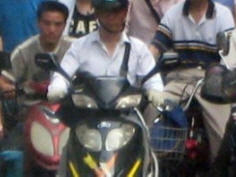 Somebody wake me up on this please on this discussion. (See references at end).
Somebody wake me up on this please on this discussion. (See references at end).
1. If we look on the streets of any city in the Global South, we see de facto PRT, personal rapid transport, all over the place.

Wednesday, April 27, 2011
PRT proposal for Delhi convinces the Chief Minister (But does it convince you? See poll results)
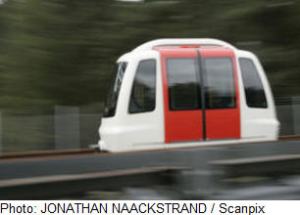 It all started innocently enough with this newspaper article that appeared in the Press Trust of India on April 26. But when posted to the Sustran Global South peer forum for comment, the floodgates opened. For full background on this vigorously discussed, even polemic proposal, we invite you to check out the discussions at http://groups.yahoo.com/group/sustran-discuss/message/6637
It all started innocently enough with this newspaper article that appeared in the Press Trust of India on April 26. But when posted to the Sustran Global South peer forum for comment, the floodgates opened. For full background on this vigorously discussed, even polemic proposal, we invite you to check out the discussions at http://groups.yahoo.com/group/sustran-discuss/message/6637
Tuesday, April 26, 2011
Dear Reader. May we rent your brain?
 World Streets iwill on 1 May close down regular publication until we have managed to resolve our challenging financial situation. If you share our deeply felt goals concerning the up-hill push to sustainable transport, sustainable cities and sustainable lives, read on and consider how you could lend a hand. We need both near term and more solid longer term backing in order to be able to continue to make our contribution. And for this, your ideas and contacts can be of real help. If you like what we are doing with World Streets, let me ask you to read on.
World Streets iwill on 1 May close down regular publication until we have managed to resolve our challenging financial situation. If you share our deeply felt goals concerning the up-hill push to sustainable transport, sustainable cities and sustainable lives, read on and consider how you could lend a hand. We need both near term and more solid longer term backing in order to be able to continue to make our contribution. And for this, your ideas and contacts can be of real help. If you like what we are doing with World Streets, let me ask you to read on.
Moving Beyond the Automobile - Exit Parking
The tenth and final video in Streetfilms' Moving Beyond the Automobile series, looks into the necessary reasons and some of the techniques for parking reform. While the context is New York City, the lessons are universal. From doing away with mandatory parking minimums, to charging the right price for curbside parking, to converting on-street parking spots into parklets and bike corrals, cities are latching onto exciting new ideas to make more room for people in our cities and repurpose the valuable public space that lines our streets.
on-street parking spots into parklets and bike corrals, cities are latching onto exciting new ideas to make more room for people in our cities and repurpose the valuable public space that lines our streets.
Who read World Streets this morning?
 World Streets makes the claim that it is a truly international journal and world-wide collaborative effort. That's an easy claim to make, but just to put some muscle on it here is a map showing the points of origin of the readers who have come in thus far this morning. A day much like any other.
World Streets makes the claim that it is a truly international journal and world-wide collaborative effort. That's an easy claim to make, but just to put some muscle on it here is a map showing the points of origin of the readers who have come in thus far this morning. A day much like any other.
Cycles of Change: Pedaling to Empowerment in Dhaka
 Bangladeshi women face significant barriers from family, neighbors and society in getting on a bike a riding around town in bright daylight. Freedom of mobility is seriously curtailed in Dhaka if women don’t feel safe to travel independently in their own city. Over 35% of female commuters in Dhaka depend on a cycle rickshaw and as more major roads ban these rickshaws, daily mobility for women is threatened furthermore. Arohi’s tagline: “Pedaling the way to empowerment” summarizes the links that we plan to draw between cycles, mobility and empowerment.
Bangladeshi women face significant barriers from family, neighbors and society in getting on a bike a riding around town in bright daylight. Freedom of mobility is seriously curtailed in Dhaka if women don’t feel safe to travel independently in their own city. Over 35% of female commuters in Dhaka depend on a cycle rickshaw and as more major roads ban these rickshaws, daily mobility for women is threatened furthermore. Arohi’s tagline: “Pedaling the way to empowerment” summarizes the links that we plan to draw between cycles, mobility and empowerment.
Monday, April 25, 2011
The Transportation Majority. Can't our politicians count?
 Public transport? Cycling? Walking? Car pooling? Car sharing? People stuck at home? Elderly? Handicapped? Poor? People unable to get to a job? Or who have to take hours to get there and don't have a choice? Spend my hard-earned money for them? Bah! Who needs it? Why bother if it's just for a few marginal people? Let's concentrate our attention and investments on the big problems, those of the majority of people. Us drivers and our cars. We are the transportation majority.
Public transport? Cycling? Walking? Car pooling? Car sharing? People stuck at home? Elderly? Handicapped? Poor? People unable to get to a job? Or who have to take hours to get there and don't have a choice? Spend my hard-earned money for them? Bah! Who needs it? Why bother if it's just for a few marginal people? Let's concentrate our attention and investments on the big problems, those of the majority of people. Us drivers and our cars. We are the transportation majority.
Wednesday, April 20, 2011
Outreach for success: Local Actors & Implementation Partners
 Too often when it comes to new transport initiatives, the practice is to concentrate on laying the base for the project in close working relationships with people and groups who a priori are favorably disposed to your idea, basically your choir. Leaving the potential "trouble makers" aside for another day. Experience shows that's a big mistake. We have to take a . . .
Too often when it comes to new transport initiatives, the practice is to concentrate on laying the base for the project in close working relationships with people and groups who a priori are favorably disposed to your idea, basically your choir. Leaving the potential "trouble makers" aside for another day. Experience shows that's a big mistake. We have to take a . . .
Saturday, April 16, 2011
Honk! Cars, People and the Planet. It's a Wonderful World (Have a stupid weekend)
 Have you ever given any thought to trying to imagine just how dumb some people think we are? My guess is that the good people of Hyundai have laid out serious money for this little film, without giving much thought to IQ's. So we can only assume that they have done this for our weekend viewing pleasure. What can we say? Well, thank you.
Have you ever given any thought to trying to imagine just how dumb some people think we are? My guess is that the good people of Hyundai have laid out serious money for this little film, without giving much thought to IQ's. So we can only assume that they have done this for our weekend viewing pleasure. What can we say? Well, thank you.
Friday, April 15, 2011
Editorial: Best City Cycling Map known to us
 To calm the passions of our spirited (but still unfinished) hate cycles/hate cars debate, here is a follow-up to our no less heady discussions on cities and cycling maps. You will see the background on all that and the interim results just below - but for now, let me introduce the map that I use each day here in Paris when I need some help for trip planning. I am sure there must be better ones out there that we shall be hearing about, but this is not a bad way to get this discussion moving here.
To calm the passions of our spirited (but still unfinished) hate cycles/hate cars debate, here is a follow-up to our no less heady discussions on cities and cycling maps. You will see the background on all that and the interim results just below - but for now, let me introduce the map that I use each day here in Paris when I need some help for trip planning. I am sure there must be better ones out there that we shall be hearing about, but this is not a bad way to get this discussion moving here.
Thursday, April 14, 2011
Ten reasons why I really hate cars (and drivers) in cities
 Well the calm of this sunny April day did not last long. Bear hours after publication of what we thought was going to be perfectly harmless op-ed criticizing bicycles and bike readers in cities, comments, scathing and otherwise, came cascading into the editorial offices of World Streets and our open Facebook Group page at http://www.facebook.com/worldstreets. And within hours the following slipped in over the transom from cyclist Ezra Goldman over at “On our own two wheels”. Let's hear what he has to say.
Well the calm of this sunny April day did not last long. Bear hours after publication of what we thought was going to be perfectly harmless op-ed criticizing bicycles and bike readers in cities, comments, scathing and otherwise, came cascading into the editorial offices of World Streets and our open Facebook Group page at http://www.facebook.com/worldstreets. And within hours the following slipped in over the transom from cyclist Ezra Goldman over at “On our own two wheels”. Let's hear what he has to say.
Ten reasons why I really hate bicycles (and cyclists) in cities.
 The following in this morning from an unidentified but apparently pretty disgruntled motorist who asked that we make his grievances widely known in the pages of World Streets. So in the spirit of equal time and with no more ado, World Streets turns over the stage to him. Let's listen to what he has to say:
The following in this morning from an unidentified but apparently pretty disgruntled motorist who asked that we make his grievances widely known in the pages of World Streets. So in the spirit of equal time and with no more ado, World Streets turns over the stage to him. Let's listen to what he has to say:
Wednesday, April 13, 2011
Budget of 2011 in India: What could they be thinking?
 While one face of the government sulks and spoils, the other dares to act. The budget making exercise this year in India is an evidence of this. There is progressive grassroots decision to discourage polluting diesel cars and encourage public transport and bicycles in India’s capital city of Delhi, which is in sharp contrast to the reactionary non-visionary action at the national level. Anumita Roychowdhury reports from Delhi.
While one face of the government sulks and spoils, the other dares to act. The budget making exercise this year in India is an evidence of this. There is progressive grassroots decision to discourage polluting diesel cars and encourage public transport and bicycles in India’s capital city of Delhi, which is in sharp contrast to the reactionary non-visionary action at the national level. Anumita Roychowdhury reports from Delhi.
Tuesday, April 12, 2011
The economic case for on-street bike parking
 If your city is to go the bike route, and we can think of no good reason why it should not, you have to figure out the parking angle. Which, once you get into it, proves to be not nearly as easy as you might at first have thought. Here is a thoughtful piece on the on-street parking piece of the city bike puzzle which appears in Grist this morning under the byline of the ever-inventive Elly Blue. We propose you check it out with that second cup of coffee.
If your city is to go the bike route, and we can think of no good reason why it should not, you have to figure out the parking angle. Which, once you get into it, proves to be not nearly as easy as you might at first have thought. Here is a thoughtful piece on the on-street parking piece of the city bike puzzle which appears in Grist this morning under the byline of the ever-inventive Elly Blue. We propose you check it out with that second cup of coffee.
Monday, April 11, 2011
World Streets Weekly: Edition of 11 April 2011
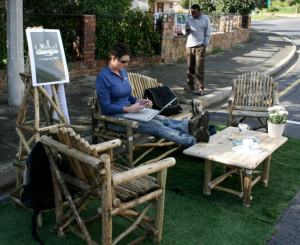 * * Click here for Weekly Edition of 11 April 2011 * *
* * Click here for Weekly Edition of 11 April 2011 * *
- – - > To receive Weekly Editions freely in 2011: click here
This week's titles:
Sunday, April 10, 2011
On wrong-minded modernization of transport: Message from Dhaka
World Streets is all about casting a broad net over transportation issues and 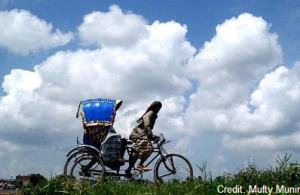 approaches in cities around the world -- reporting on the good, the bad and the ugly -- so that we can learn from each other and do, hopefully, just a bit better in our own patch. Today's communication from Dhaka reports on a familiar Third World policy conflict about a popular and very important transport mode which is unloved by some but which is providing affordable, environmental, and efficient mobility for almost a third of all trips in the nation's capital. Seven days a week, on demand service when you need it, and with heavy use by women and children. If you have a look at what is going on there in this all-too familiar tussle of ideas and authority, we bet you will learn something for your own city from Dhaka.
approaches in cities around the world -- reporting on the good, the bad and the ugly -- so that we can learn from each other and do, hopefully, just a bit better in our own patch. Today's communication from Dhaka reports on a familiar Third World policy conflict about a popular and very important transport mode which is unloved by some but which is providing affordable, environmental, and efficient mobility for almost a third of all trips in the nation's capital. Seven days a week, on demand service when you need it, and with heavy use by women and children. If you have a look at what is going on there in this all-too familiar tussle of ideas and authority, we bet you will learn something for your own city from Dhaka.
Saturday, April 9, 2011
Honk! Bus of the Future? (Have a stupid weekend)
 Dutch astronaut unleashes 155 mph 'Superbus'.
Dutch astronaut unleashes 155 mph 'Superbus'.
From an article posted in the Science section of The Register, 8th April 2011. See the Superbus in action here. You can say that you were among the first to see it in action.
--> Read on:
Friday, April 8, 2011
Italians are moving less. But using public transport more
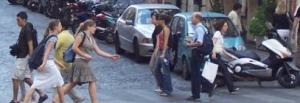 The economic crisis combined with the rising cost of fuel has caused significant changes in travel behavior of Italians -- is what emerges from the year-end economic report Audimob of 2010 of the Observatory on Mobility Behavior of the Italian National Institute for Training and Research for Transport (ISFORT)
The economic crisis combined with the rising cost of fuel has caused significant changes in travel behavior of Italians -- is what emerges from the year-end economic report Audimob of 2010 of the Observatory on Mobility Behavior of the Italian National Institute for Training and Research for Transport (ISFORT)
Bikes, Helmets and the Long Arm of the Law
 We had a good look at this one back in 2008 in the context of advising local government concerning the issue of requiring cyclists to wear helmets on the then-being considered public bike project.
We had a good look at this one back in 2008 in the context of advising local government concerning the issue of requiring cyclists to wear helmets on the then-being considered public bike project.
We asked for the counsel of a number of international experts with backgrounds and contrasting views in this area, and this short report summarizes their information and recommendations. Still looks pretty good in 2011.
* Click here for World Streets report - Bikes, helmets and the law
Thursday, April 7, 2011
Picking a few bones with our old World Bank friends
 We try very hard on World Streets to stay firmly on topic. But given the swirling many-sided kaleidoscopic complexity of our concerns, we are obliged from time to time to step outside of the usual lines. For this reason, you will find here an article challenging the eventual stewardship role of the World Bank in a new global Green Climate Fund (GCF) initiative which is being discussed this week in Bangkok by climate change negotiators from 190 countries.
We try very hard on World Streets to stay firmly on topic. But given the swirling many-sided kaleidoscopic complexity of our concerns, we are obliged from time to time to step outside of the usual lines. For this reason, you will find here an article challenging the eventual stewardship role of the World Bank in a new global Green Climate Fund (GCF) initiative which is being discussed this week in Bangkok by climate change negotiators from 190 countries.
--> Read on:
City as a time capsule: Urban highway construction mania still booming in 2011
 Transport planning and policy in Lahore Pakistan today, as reported by public policy consultant Hassaan Ghazali, looks like something that was dragged out of a moss-covered time capsule on a hot day: a tawdry reminder of the kind of old mobility thinking, interest-wrangling and mindless investments of hard-earned taxpayer money that challenged and in many cases helped destroy the urban fabric of cities across North America and in many other parts of the world half a century ago.
Transport planning and policy in Lahore Pakistan today, as reported by public policy consultant Hassaan Ghazali, looks like something that was dragged out of a moss-covered time capsule on a hot day: a tawdry reminder of the kind of old mobility thinking, interest-wrangling and mindless investments of hard-earned taxpayer money that challenged and in many cases helped destroy the urban fabric of cities across North America and in many other parts of the world half a century ago.
Wednesday, April 6, 2011
Guangzhou, China: Winning The Future With BRT
Guangzhou is one of the fastest growing cities in the world. The economic hub of C
 hina's southern coast, it has undergone three decades of rapid modernization, and until recently the city’s streets were on a trajectory to get completely overrun by traffic congestion and pollution. But Guangzhou has started to change course. Last year the city made major strides to cut carbon emissions and reclaim space for people, opening new bus rapid transit and public bike sharing systems.
hina's southern coast, it has undergone three decades of rapid modernization, and until recently the city’s streets were on a trajectory to get completely overrun by traffic congestion and pollution. But Guangzhou has started to change course. Last year the city made major strides to cut carbon emissions and reclaim space for people, opening new bus rapid transit and public bike sharing systems.Tuesday, April 5, 2011
Whence Social Media on World Streets
If anyone knows where this whole business of balancing what just might be highly useful linking with the constraints  imposed by a seriously time-challenged 24 hour day, I hope they will let the editor of this journal know. True there is a great deal that is out there, and every bit of it is in constant kaleidoscopic evolution. My first temptation is to stick to what I know works, and give the rest a pass. But another part of my brain tells me that this could be a big mistake.
imposed by a seriously time-challenged 24 hour day, I hope they will let the editor of this journal know. True there is a great deal that is out there, and every bit of it is in constant kaleidoscopic evolution. My first temptation is to stick to what I know works, and give the rest a pass. But another part of my brain tells me that this could be a big mistake.
Monday, April 4, 2011
North/South perspectives: When a cyclist is not a cyclist is not a cyclist
If you look at that Sempé time-phased cartoon of the other day in World Streets, "A Short History of Social Mobility", the lesson that leaps out at us is that what we are seeing in terms of cyc ling in the richer parts of the world is a phenomenon that in both economic and social terms is very specific to those places. And if by contrast we are looking for more universal lessons, especially for people in the poor
ling in the richer parts of the world is a phenomenon that in both economic and social terms is very specific to those places. And if by contrast we are looking for more universal lessons, especially for people in the poor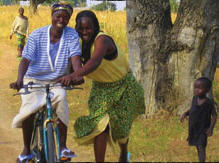 est developing countries where there is a crying need for better, more affordable mobility, we may need to look elsewhere. Let's hear what our friend Ezra Goldman has to say on this score after an enjoyable week with the cycling buffs in Seville for the annual Velo-City global bicycling bash. (Followed at the end with a few words on our a-borning Africa Streets collaborative project. )
est developing countries where there is a crying need for better, more affordable mobility, we may need to look elsewhere. Let's hear what our friend Ezra Goldman has to say on this score after an enjoyable week with the cycling buffs in Seville for the annual Velo-City global bicycling bash. (Followed at the end with a few words on our a-borning Africa Streets collaborative project. )
World Streets Weekly: Edition of 4 April 2011

* * * Click here for Weekly Edition of 4 April 2011 * * *
- – - > To receive Weekly Editions freely in 2011: click here
--> Read on:
Friday, April 1, 2011
Stop press! Carsharing is apparently not dead after all.*
We always enjoy a good knock-up on World Streets. Keeps us thinking. After yesterday's piece in which Nicolas le Douarec undertook to stretch our minds and challenge us to consider carsharing from some other perspectives, including apparently in a coff in, we hear today from an old friend Michael Glotz-Richter from Bremen who has been orchestrating carsharing in his city and trans-European collaboration in the field for the last decade, running an EU program which currently goes by the somewhat mystifying acronym of momo (see below). Here is what Michael has to say about yesterday's reported corpse.
in, we hear today from an old friend Michael Glotz-Richter from Bremen who has been orchestrating carsharing in his city and trans-European collaboration in the field for the last decade, running an EU program which currently goes by the somewhat mystifying acronym of momo (see below). Here is what Michael has to say about yesterday's reported corpse.


